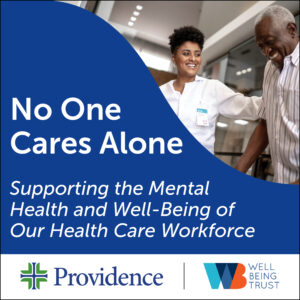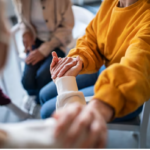We created this playbook to outline our programs as a model for what’s possible for other health care organizations to implement for their caregivers.
Arpan Waghray, M.D., CEO, Providence's Well Being Trust Tweet
With the onset of the Covid-19 pandemic, health care workers across the world faced unprecedented stress.
This stress came on top of the many challenges health care workers faced before the pandemic. While Providence facilities had some mental wellness programs in place, such as the Employee Assistance Program, it quickly became clear that we would need to build additional offerings if we were to meet the ever-increasing need for mental wellness support.
As part of Providence’s and Well Being Trust’s commitment to supporting the mental wellness of caregivers, we developed No One Cares Alone (NOCA). NOCA is a comprehensive menu of programs and tools to support our diverse team of caregivers at every stage of their mental wellness journey.
We created this playbook to outline our programs as a model for what’s possible for other health care organizations to implement for their caregivers. When looking to develop a program like No One Cares Alone, it’s important to have two simple, foundational components in place:
- The first is to be responsive when caregivers seek help, offering solutions based on their needs and preferences.
- And the second is to understand that seeking help does not come naturally to many caregivers.
Leaders must proactively lean in and create an organizational culture that normalizes help-seeking behavior while simultaneously empowering all caregivers to identify and support those in need.
We understand that every health care organization is starting at a different place with varying resources. When looking to improve your caregiver mental wellness offering, just getting started is the most crucial step of all. For instance, you might decide to begin with a gap analysis utilizing the primary, secondary, and tertiary intervention approach and optimizing existing programs and resources.
As you start small, we recommend taking an inventory each quarter to assess your progress, regularly gathering feedback from program participants in the form of program utilization, member satisfaction data, and iterating with your next phase of development and implementation to optimize your program efficacy.
Just getting started is the key
Trust your human resource experts and mental health professionals to develop effective programs, knowing you can iterate as you progress in the implementation of a No One Cares Alone program.






